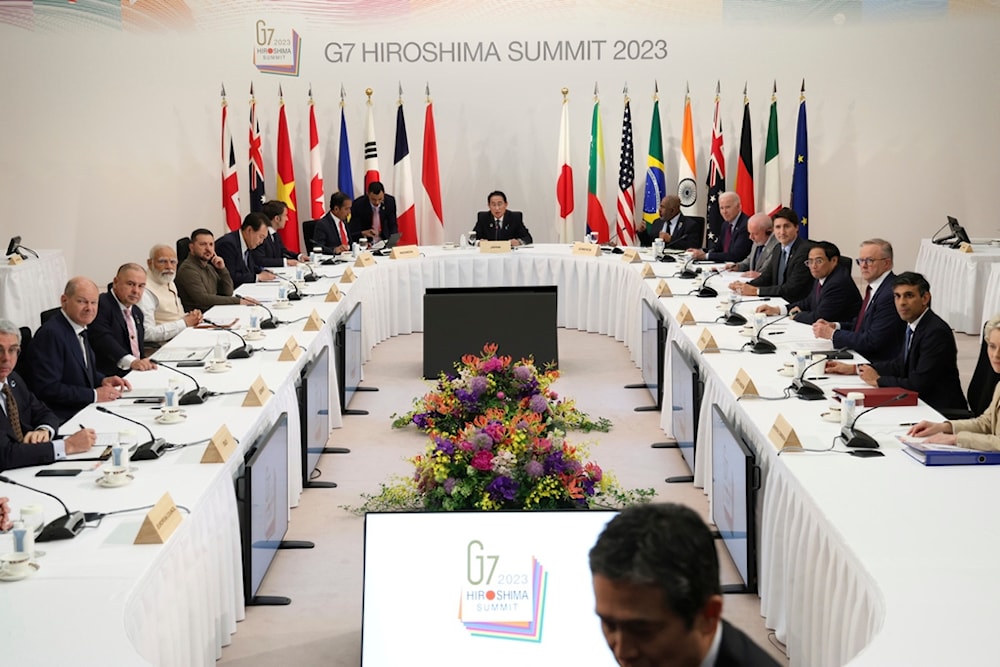G7 discussing ways to give Russia's frozen funds in EU to Ukraine
On Saturday, the Financial Times reported updates on how the G7 has been trying to allocate Russia's frozen funds, worth $300 billion, to Ukraine as challenges keep delaying designated aid from the US and EU.
-

Leaders of the Group of Seven nations attend a session with other guest countries including Ukraine's Volodymyr Zelensky in Hiroshima, western Japan, Sunday, May 21, 2023. (AP)
On Saturday, the Financial Times reported updates on how the G7 has been trying to allocate Russia's frozen funds, worth $300 billion, to Ukraine as challenges keep delaying designated aid from the US and EU.
The newspaper cited a US government discussion saying "G7 members and other specially affected states could seize Russian sovereign assets as a countermeasure to induce Russia to end its aggression."
G7 countries have initiated active efforts to investigate methods for seizing the assets of Russia's central bank. This move comes following the blocking of financial assistance packages for Kiev by Republicans in the United States and Hungarian Prime Minister Viktor Orban earlier this week, as reported by the news outlet.
According to a statement from a US official, the White House believes that the window for deciding on the utilization of frozen Russian funds is narrowing. The official mentioned that G7 members might address this matter during a potential leaders' summit scheduled for February.
Read more: Ukraine to receive $1.34bln from World Bank to pay salaries, pensions
Ukraine sparks conflict in Congress
On Tuesday, Ukrainian President Volodymyr Zelensky was set to visit Congress and the White House to seek increased US military assistance.
However, the Republican Party appears largely unresponsive to his growingly urgent appeals. Throughout the nearly two-year war in Ukraine, the United States has spearheaded a Western coalition, providing substantial financial support in the form of weaponry and ammunition.
But Republicans are ever-more openly rejecting the need to fund Ukraine, saying that President Joe Biden needs to devote more attention to domestic security, particularly to stopping illegal migration over the US-Mexican border.
Congress is facing peak divisions over providing support to Ukraine amid the ongoing war, marking the most significant split during the crisis as Ukraine is rapidly depleting the military aid previously supplied by the United States.
Senate Republicans are conditioning their endorsement for additional funding to Ukraine on the condition that Democrats, led by President Joe Biden, agree to implement reforms in the asylum system and enhance border security—proposals that the Democrats have already opposed.
The Republicans are also questioning whether Ukraine should keep fighting at all.
In further detail, Zelensky held meetings with the leaders of the International Monetary Fund (IMF) and World Bank. The IMF disclosed the approval of a fresh $900 million installment as part of an existing long-term loan.
Republican senators also blocked a White House request for $106 billion in emergency aid, primarily designated for Ukraine and "Israel".
Read more: IMF warns of up to 7% global GDP loss due to Ukraine conflict
Funds to Ukraine: "senseless, irrational, and incorrect"
In a series of unfortunate events for Ukraine, Hungarian Prime Minister Viktor Orban announced on Friday that his country vetoed the EU's plan to supply tens of billions of euros in assistance to Ukraine, which followed his reported walk-out when other leaders voted for formal talks on Ukraine's bid to join the EU.
Presented by the European Commission, the plan aimed to amend the joint EU budget in which Brussels wanted to designate €50 billion ($54 billion) in spending over four years.
Hungary opposed it on the basis that aid should serve a shorter term and is pending renewal after review. Orban took to social media to affirm his veto of the proposal and review of the EU's long-term budget Multiannual Financial Framework (MFF).
Orban described the decision as “completely senseless, irrational and incorrect,” and assured Hungary was not a part of it. He claimed in a video statement that “if the 26 [out of the 27 member states] decide to do so, they should go their own way.”
Starting accession negotiations with #Ukraine is a bad decision. Hungary did not participate in the decision. pic.twitter.com/omYLSxefkI
— Orbán Viktor (@PM_ViktorOrban) December 14, 2023

 4 Min Read
4 Min Read









